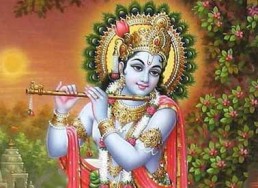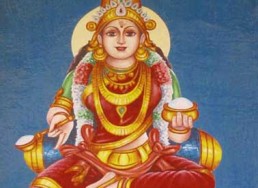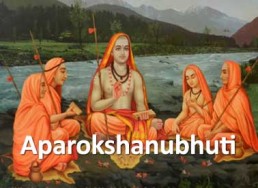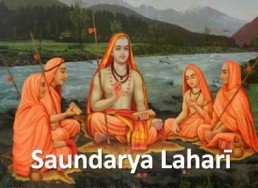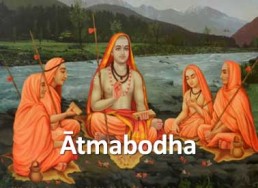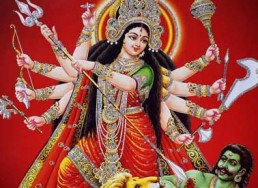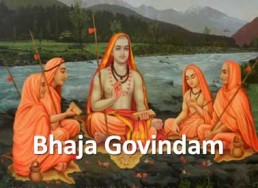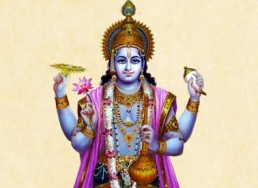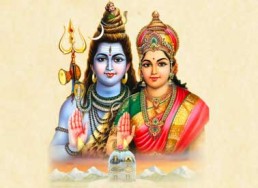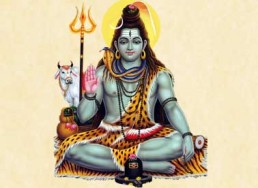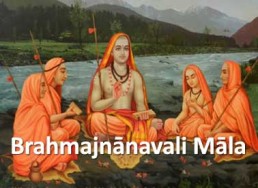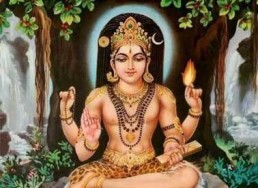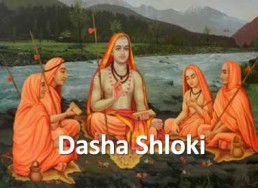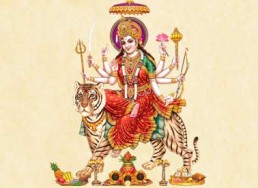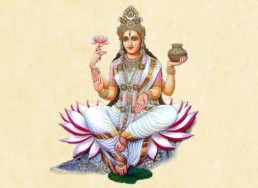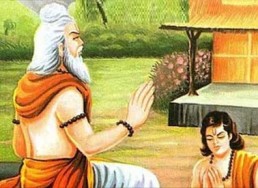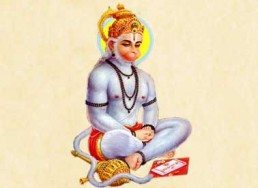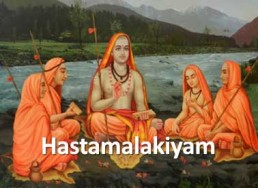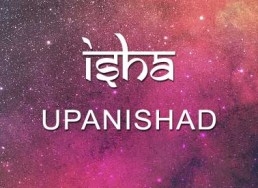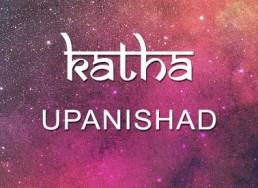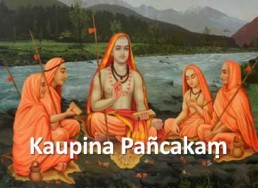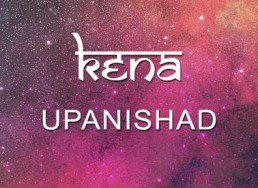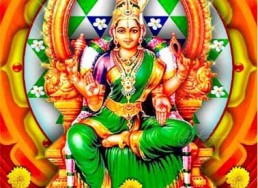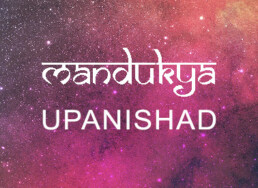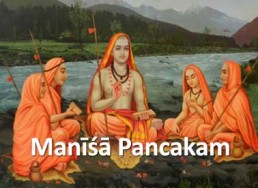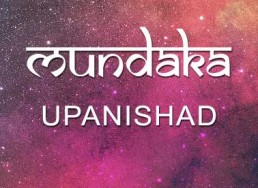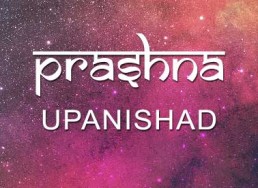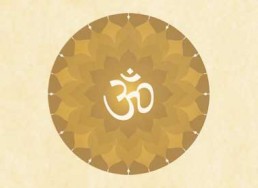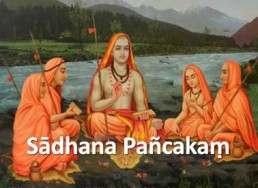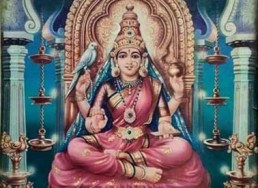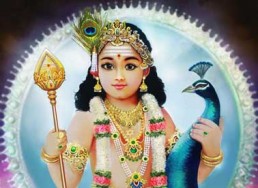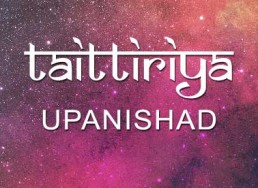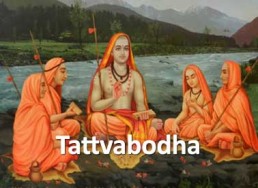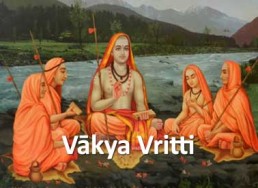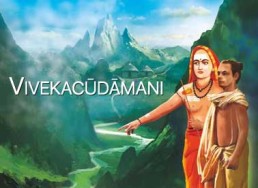Totakashtakam
महितोपनिषत् कथितार्थनिधे ।
हृदये कलये विमलं चरणं
भव शंकर देशिक मे शरणम् ॥ १॥
mahitopaniṣat kathitārthanidhe .
hṛdaye kalaye vimalaṃ caraṇaṃ
bhava śaṃkara deśika me śaraṇam .. 1..
भवसागरदुःखविदूनहृदम् ।
रचयाखिलदर्शनतत्त्वविदं
भव शंकर देशिक मे शरणम् ॥ २॥
bhavasāgaraduḥkhavidūnahṛdam .
racayākhiladarśanatattvavidaṃ
bhava śaṃkara deśika me śaraṇam .. 2..
निजबोधविचारण चारुमते ।
कलयेश्वरजीवविवेकविदं
भव शंकर देशिक मे शरणम् ॥ ३॥
nijabodhavicāraṇa cārumate .
kalayeśvarajīvavivekavidaṃ
bhava śaṃkara deśika me śaraṇam .. 3..
समजायत चेतसि कौतुकिता ।
मम वारय मोहमहाजलधिं
भव शंकर देशिक मे शरणम् ॥ ४॥
samajāyata cetasi kautukitā .
mama vāraya mohamahājaladhiṃ
bhava śaṃkara deśika me śaraṇam .. 4..
भविता समदर्शनलालसता ।
अतिदीनमिमं परिपालय मा
ंभव शंकर देशिक मे शरणम् ॥ ५॥
bhavitā samadarśanalālasatā .
atidīnamimaṃ paripālaya mā
ṃbhava śaṃkara deśika me śaraṇam .. 5..
विचरन्ति महामहसश्छलतः ।
अहिमांशुरिवात्र विभासि गुरो
भव शंकर देशिक मे शरणम् ॥ ६॥
vicaranti mahāmahasaśchalataḥ .
ahimāṃśurivātra vibhāsi guro
bhava śaṃkara deśika me śaraṇam .. 6..
समतामयतां नहि कोऽपि सुधीः ।
शरणागतवत्सल तत्त्वनिधे
भव शंकर देशिक मे शरणम् ॥ ७॥
samatāmayatāṃ nahi ko’pi sudhīḥ .
śaraṇāgatavatsala tattvanidhe
bhava śaṃkara deśika me śaraṇam .. 7..
न च किंचन काञ्चनमस्ति गुरो ।
द्रुतमेव विधेहि कृपां सहजां
भव शंकर देशिक मे शरणम् ॥ ८॥
na ca kiṃcana kāñcanamasti guro .
drutameva vidhehi kṛpāṃ sahajāṃ
bhava śaṃkara deśika me śaraṇam .. 8..
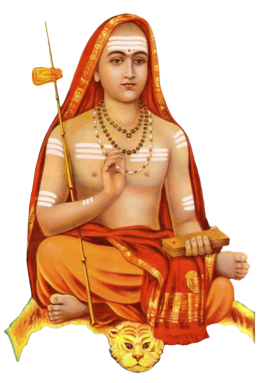
Description
Per the Mādhavīya Śankaravijayam, when Adi Shankara was at Sringeri, he met a boy named Giri. Adi Shankara accepted the boy as his disciple. Giri was a hard-working and loyal servant of his Guru, Adi Shankara, though he did not appear bright to the other disciples. One day, Giri was washing his Guru’s clothes, when Adi Shankara sat down to begin a lesson on Advaita Vedanta. He however did not start the lesson saying he was waiting for Giri to come back from his chores. At this, another shishya, Padmapada pointed to a wall and said that teaching Giri would be the same as teaching this wall (a dumb object).
It seems that Sankaracharya wanted to humble them and also Sankaracharya was pleased with the devotion of Giri who was serving him. Sankaracharya did not say anything but kept waiting. Then the disciple came bringing the clothes and drying them. At that time, he was singing this song glorifying the greatness of his teacher Sankara. They thought Giri was an illiterate person not knowing Sanskrit and incapable of composing anything. Hearing this, all other disciples were wonderstruck. By mere Sankalpa, it is said that Sankaracharya gave all knowledge to him. This verse happens to be in a special Sanskrit metre known as Thōtaka Vruttam. So this particular metre is called Thōtaka metre. Thus Giri got the name Thōtakachary, after the metre.
His Pūrvāshrama name was something else and he got the name Thōtaka after this metre. Therefore, this work is called Thōtakāshtakam due to two reasons. One reason is that it is in Thōtakä metre and the other reason being that it is composed by Thōtakacharya.
Thōtakacharya has not written many works or many are not available for us. There is another work by Thōtaka. It is an advanced treatise on Vēdanta known as Shruti Sara Samuddharanam which literally means extracting the essence of the Vedas.
It is a work consisting of 174 or 178 verses in which Thōtakā analyzes the Mahāvākyam ‘Tatvamasi‘ and he establishes Jīvātma Paramātma Aikyam logically and he refutes all other systems of philosophy. This Shruti Sära Samuddharanam also is in Thōtaka metre. At the end of Shruti Sara Samuddharanam work, there is a Mangala Sloka on Lord Vishnu. That Mangala Sloka alone is the famous Dhyana Slöka used in Vishnu Sahasra Nama which is ‘bhooh padau yasya nābhirviyadasuranilash chandra suryau cha netre‘. This is also in the same metre.
In this composition, we do not find Vedāntic teaching here, but it is the glorification of his Guru Adi Sankara. This is the background of this work. And in all the eight verses, the fourth line is the same which is bhava sankara dēsika mē saranam
Dēsikaha means Acharyaha. A guru is called Desikaha. Shastra Tatvam Upadishati iti dēsikaha. The one who teaches the Shastram, the one who imparts the Shastric knowledge is called desika or Acharyaha. So Sankara dēsika means Sankaracharya.
Sankaracharya got the name because he did Mangalam, he did good to the entire world or the society. The word ‘Sam‘ means Mangalam, ‘Karaha’ means the one who brings about. Therefore, ‘Samkaraha‘ means Mangalakarta. Mangalakari is meaning of the word Sankara. The word Sankara originally belongs to Lord Shiva.
Since Sankaracharya is considered to be the incarnation of Lord Shiva, the Acharya also got this name ‘Sankara’.
Sankaram Sankaracharyam Keshavam Badarāyanam
Vyasacharya is supposed to be an incarnation Vishnu and Sankara is supposed to be an incarnation of Shiva.
Therefore, here Thōtakā addresses Sankaracharya, Shankara Desika, or Bhagavan Sankaracharya. Mē Saranam Bhava – May you become my refuge, my shelter, my savior. This is at the end of every verse.
Excerpt from ‘Thotakashtakam explanation by Swami Paramarthananda.’
Other Sankara Shlokams
Achyutashtakam
Achyutashtakam, composed by Sri Adi Shankaracharya, is in praise of Lord Krishna. It is a simple yet wonderful hymn of eight stanzas comprising the names of lord Vishnu with main emphasis on his incar
Annapurna Stotram
Annapurna is the goddess of food and nourishment. She is a form of Parvati, the inseparable shakti of Lord Shiva. Anna is translated as "food" and "grains" and purna means "full" or "complete". Annapu
Aparokshānubhuti
Shlokams,Prakarana Grantha,Sankara
Aparokshanubhuti, or Direct Experience of the Absolute is an introductory work by Adi Shankaracharya that expounds Advaita Vedanta philosophy. The word means Self-Realization
Ashtavakra Gita Home
Shlokams,Prakarana Grantha,Sankara
The Ashtavakra Gita is an ancient Sanskrit scripture that presents a powerful conversation between the sage Ashtavakra and King Janaka on the nature of the Self, liberation, and ultimate truth. Unlike many other spiritual texts, it is remarkable for…
Ātmabōdha
Shlokams,Prakarana Grantha,Sankara
Atmabodha, meaning Self-knowledge or Self-awareness, is an exceptionally lucid and readable work of Shankaracharya. Consisting of sixty-eight verses or shlokas, it is in a sense a simple summary of his entire Vedantic structure of thought, intended,…
Atmabodha All Verses
Shlokams,Atmabodha Verse,Sankara
Atmabodha - Full text with meaning, audio and translation from Sanskrit to English, Telugu, Kannada, Tamil and more
Ayigiri Nandini
The Mahishasura Mardini Stotram also known popularly as Aigiri Nandini, holds immense significance during Navratri. The word Mahisha means buffalo and Asura means Rakshasa or Demon. Composed by the great sage Adi Shankaracharya around 810 AD, this…
Ayigiri Nandini – Chanting – English
The Mahishasura Mardini Stotram also known popularly as Aigiri Nandini, holds immense significance during Navratri. The word Mahisha means buffalo and Asura means Rakshasa or Demon. Composed by the great sage Adi Shankaracharya around 810 AD, this…
Ayigiri Nandini – Chanting – Sanskrit
The Mahishasura Mardini Stotram also known popularly as Aigiri Nandini, holds immense significance during Navratri. The word Mahisha means buffalo and Asura means Rakshasa or Demon. Composed by the great sage Adi Shankaracharya around 810 AD, this…
Bhaja Govindam
Shlokams,Vishnu,Sankara,Govinda,Krishna,Prakarana Grantha
Bhaja Govindam is one of the most popular hymns penned by Adi Shankaracharya. He has packed into the Bhaja Govindam song the substance of all Vedanta, and set the oneness of Jnana and Bhakti to melodious music.
Bhavani Ashtakam
Composed by Sri Adi Shankaracharya. Bhavani Ashtakam is a popular hymn on Goddess Bhavani, who is known for her protection and merciful nature. The Lyrics of this hymn have an in-depth meaning that wh
Bilvashtakam
Composed by Sri Adi Shankaracharya, the famous Bilvashtakam extols the virtues of the Bilva leaf (also spelt Vilva, Bilwa) and Lord Shiva’s love for it. The following com
Bilvashtakam 14 Verses
Note: For the original version of Bilvashtakam please click here. Composed by Sri Adi Shankaracharya,
Brahmajnānavali Māla
Shlokams,Prakarana Grantha,Sankara
In this Prakarana Grantha (topical text or treatise) attributed to Sri Sankara the characteristics of the person who has realized that he is Brahman are described. The aspirant for liberation is advised to meditate on these in order to attain that…
Dakshinamurthy Stotram
Shlokams,Sankara,Shiva,Dakshinamurthy
The Dakshinamurti Stotra is a Sanskrit religious hymn to Shiva by Sri Adi Shankaracharya. It explains the metaphysics of the universe in the frame of the tradition of Advaita V
Dasa Shloki
Shlokams,Prakarana Grantha,Sankara
This composition in ten verses - dasha shloka - is similar to the Nirvana Shatakam, and like it, a summation, in typically Shankara's way, of the unyielding non-dual vision of Advaita. Here too, Shankara's attempt is to deny everything else only to…
Devi Aparadha Kshamapana Stotram
Composed by Sri Adi Shankaracharya. Aparadha Kshamapana stotram is usually recited after a recital or after the completion of Puja. Its like asking for forgiveness from Goddess for various mistakes th
Ganesha Pancharathnam
The composer, Guru Sri Adi Shankaracharya had praised the God Ganesha by presenting these five stanzas as five jewels, hence the name Maha Ganesha Pancharatnam.
Ganesha Stavah
Ganesha Stavah or Ganapati Stavah is a set of 13 verses that describe the glory of Lord Ganesha. Gaṇapati stavaḥ is said to be from Ganesh Purana - upāsanā khaṇḍa adhyāya 13.
Ganga Ashtakam
Gangashtakam is an octet on river Ganga composed by Shri Adi Shankaracharya.
Gangā stotram
Sri Adi Shankaracharya has written a song ”Devi Suresvari Bhagavati Gange” and the Official Name for this song is ”Sri Sri Ganga Stotram”. In this song Sree Shankaracharya describes the glories of Sri
Guru Ashtakam
The Guru Ashtakam is a Sanskrit hymn composed by Adi Shankaracharya, the 8th-century Indian philosopher and saint who consolidated the doctrine of Advaita Vedanta. In the Vedan
Guru Paduka Stotram
Guru Paduka Stotram is a very powerful chant that glorifies the "Padukas (Sandals) of the Guru," which are symbolically represented as "the boat to help cross the endless ocean
Hanuman Pancharatnam
Garland of five gems on Shri Hanuman composed by Shri Adi Shankaracarya.
Hastāmalakiyam
Shlokams,Prakarana Grantha,Sankara
Composed by Hastāmalaka Ācārya, a direct disciple of Adi Sankaracharya, the Hastāmalaka Stotraṁ or Hastāmalakiyam is a short Vedāntic text about the higher nature of the Self.
Ishavasya All Verses
Introduction to Isavasya Upanishad The Īśāvāsyopaniṣad—so called from its initial words—forms the concluding chapter of the Saṃhitā of the Suklayajurveda The name of
Ishavasya Upanishad
The Isha Upanishad is embedded as the final chapter of the Shukla Yajurveda and is one of the shortest Upanishads, with 18 verses. It is the very first Upanishad in the Muktika canon of 108 Upanishads.
Ishvaro Guru Atmeti
Shlokams,Shiva,Dakshinamurthy,Guru,Sankara
Salutations to Lord Dakshinamurti, who is all-pervasive like space but who appears (as though) divided as Lord, Guru, and the Self.
Jagannath Ashtakam
Shri Jagannath Ashtakam was composed by Adi Sankracharya in praise of Lord Jagannath on his visit to Puri. The merit of reciting the sacred Jagannath ashtakam carefully is such that, one becomes sinle
Kalabhairava Ashtakam
Composed by Sri Adi Shankaracharya. The hymn illustrates the personality of Kala Bhairava of Kashi, the God of Death(kala). Those who study these 8 verses on Kala Bhairava, which are enticing and whic
Kalika Ashtakam
The Kalika Ashtakam is a Sanskrit hymn of eight verses dedicated to Goddess Kali, the fierce and protective form of the Divine Mother. This devotional text focuses on Ka
Kamakshi Stotram
Composed by Sri Adi Shankaracharya. Goddess Kamakshi is a form of Tripura Sundari or Parvati or the universal mother goddess. The word is derived from the heritage “Ka” meaning Goddess Saraswati (Godd
Kanakadhara Stotram
Kanakadhara Stotram is a hymn (Stotra) composed in Sanskrit by Sri Adi Sankaracharya. Kanakadhara means “stream” (dhara) of “gold” (kanaka). The 21 stanzas of kanakadhārā stotram then became famous and are read by all devout Hindus for……
Kasi Viswanathashtakam
Composed by Sri Adi Sankaracharya in praise of Lord Shiva. That man who reads this octet with its meaning, which sings the praise of Shiva who is the lord of Varanasi, would get knowledge, wealth, gre
Katha Upanishad
The Katha Upanishad is embedded in the last 8 sections of the Krishna Yajurveda. It has two chapters divided into three Vallis each. It is a Mukhya upanishad and listed as #3 in the Muktika canon of 108 Upanishads.
Kathopanishad All Verses
The Katha Upanishad is a collection of philosophical poems representing a conversation between the sage Naciketas and Yama (god of death). They discuss the nature of Atman, Brahman and Moksha (liberation). The book is made up of six sections…
Kaupina Panchakam
Shlokams,Prakarana Grantha,Sankara
Kaupina Panchakam - This is a very short poem composed by Sri Adi Sankaracharya, with five stanzas that glorify the life of a Sannyasi. The Kaupina is made up of a rectangular strip of cotton cloth used to cover the genitals with the help of the…
Kena Upanishad
The Kena Upanishad is embedded inside the last section of the Talavakara Brahmanam of the Samaveda. It is a Mukhya upanishad and listed as #2 in the Muktika canon of 108 Upanishads.
Kenopanishad-All-Verses
The Kena Upanishad or Kenopanishad (Kenopaniṣat) (also known as the Talavakara Upanishad) elucidates the concept of nirguna (qualityless) Brah
Lakshmi Narasimha Karavalambam
Narasimha is a fierce avatar of the Hindu god Vishnu, one who incarnates in the form of part lion and part man to destroy evil and end religious persecution and calamity on Earth, thereby restoring Dh
Lalitha Panchakam
Composed by Sri Adi Shankaracharya in praise of mother Lalitha. The phalastuti of the stotram says the divine mother will give good knowledge, wealth, fame, happiness, fortune, and prosperity.
Lalitha Sahasranamam
Lalitha Sahasranamam is a sacred Hindu text from the Brahmanda Purana which lists the thousand names of the Hindu mother goddess Lalita Devi, a manifestation of the Divine Mother (Shakti), and is therefore used in the worship of Durga, Parvati,…
Mahishasura Mardini Storam
Mahishasura Mardini Stotram - This is a prayer to the Goddess who killed Mahishasura. “The place where Sri Mahishasura Mardini Stotram is sung every day, I will always be present and never leave.” - The Devi’s proclamation in the 12th chapter of the…
Mandukya Karika
The Mandukya Karika represents the first systematic philosophical exposition of Advaita Vedanta, transforming the concise twelve-verse Mandukya Upanishad into a comprehensive 215-verse treatise on non-dual philosophy.
Mandukya Upanishad All Verses
Mandukya Upanishad - A detailed Summary The Mandukya Upanishad is the shortest yet one of the most profound Upanishads, consisting of just 12 verses. It explores the n
Manishā Panchakam
Shlokams,Prakarana Grantha,Sankara
Adi Sankara’s ‘Manisha Panchakam’ refers to the conclusive wisdom or determinate knowledge asserted in five verses. Manisha means conclusive wisdom or determinate knowledge and Panchakam refers to the five verses.
Mauna Vyakhya
Shlokams,Sankara,Shiva,Dakshinamurthy
I salute Sri Dakshinamurti, who is not subject to time, who makes known the truth of Brahman through the implied meaning of words, who is surrounded by disciples who are themselves Rishis and committe
Meenakshi Pancharatnam
Meenakshi Pancharatnam (The five jewels of Meenakshi) is a popular stotram composed by Sri Adi Shankaracharya as a ritual incantation on goddess Meenakshi. This stotram explains the divine qualities,
Mundaka Upanishad
The Mundaka Upanishad is embedded is embedded in the Atharva Veda. It is a Mukhya upanishad and listed as #5 in the Muktika canon of 108 Upanishads.
Narmada Ashtakam
Composed by Sri Adi Shankaracharya in praise of river Narmada.
Nidhaye Sarvavidyanam
Shlokams,Sankara,Shiva,Dakshinamurthy
Salutations to Sri Dakshinamurti, the reservoir of knowledge (the abode of all learning), the healer of all those who suffer from the disease of samsāra, and the teacher of the whole world.
Nirvana Shatakam
Nirvana Shatkam (Atma Shatakam) of Adi Sankara Commentary and Notes Translated by S. N. Sastri Introduction: Sri Sankara Bhagavatpada has blessed poster
Om Namah Pranavarthaya
Shlokams,Sankara,Shiva,Dakshinamurthy
Om. Salutation to the one who is the meaning of praņava, who is in the form of pure knowledge, who is taintless and who is free from any change. To that Sri Dakshinamurti, (my) salutations.
Om Namo Bhagavate Dakshinamurthaye
Shlokams,Sankara,Shiva,Dakshinamurthy
Om. Salutations to Bhagavan Dakshinamurti. (Oh Lord) Bless me with memory, the capacity to think properly, and clarity, wisdom.
Pandurang Ashtakam
Shri Pandurang ashtakam (Pandurangashtakam) Stotra is a very beautiful creation of Shri Adi Shankaracharya. Lord Vithal, or Panduranga Vittala, is an incarnation of Lord Vishnu and is worshipped in t
Prashna Upanishad
The Prashna Upanishad is embedded is embedded in the Atharva Veda. It is a Mukhya upanishad and listed as #5 in the Muktika canon of 108 Upanishads.
Prashnopanishad-All-Verses
The Prashnopanishad (Prashna Upanishad) is a key philosophical text within the Indian spiritual tradition, part of the larger body of literature known as the Upanishads.
Prātah Smaranam
Pratah Smaranam is a prayer composed by Sri Adi Shankaracharya consisting of three stanzas in which the mind (manas) speech (vak), and body (kaya) of the individual are
Ranganatha Ashtakam
Ranganatha Ashtakam was written by Adi Sankara Bhagavatpada when he stood before Sri Ranganatha swamy in Srirangam, during his travels. This Ashtakam reveals that Adi Sankara was overwhelmed by Lord R
Sādhana Panchakam
Shlokams,Prakarana Grantha,Sankara
Sadhana Panchakam - Adi Sankara in these five simple looking verses lovingly lists the ways and means which can readily be followed by all students of Vedanta, seeking direct experience of the divine state beyond the mind, the spring of…
Sankaram Sankaracharyam
Salutations again and again to Lord Shiva in the form of Sri Sankaracharya and Lord Vishnu in the form of Veda Vyasa, who were the authors of sutra and bhasya.
Saundarya Lahari
Shlokams,Prakarana Grantha,Sankara
The Saundarya Lahari, a devotional poem of one hundred hymns, is ascribed to the great teacher Shankaracharya. The poem is divided into two parts; the first part, comprised of verses 1 through 41, is called the Anandalahari, or Wave of Bliss, and…
Sharada Bhujangam
Composed by Sri Adi Shankaracharya on devi Sharada. Sringeri is the first math (monastery) built by Sri Adi Shankaracharya. It has the famous temple of Devi Sharada inside it. The math is situated on
Shiva Aparadha Kshamapana Stotram
The Śiva Aparādha Kṣamāpaṇa Stotram, or "Hymn of Forgiveness for Offenses to Lord Śiva," is a heartfelt composition by the revered philosopher and saint Śrī Ādi Śaṅkarācārya. T
Shiva Ashtakam
Composed by Adi Shankaracharya. This ashtakam is a descriptive salutation of the different attributes of Shiva. The great yogi who is referred to as Ardhanarishwara (the one who has included the femin
Shiva Manasa Puja
Sri Adi Shankaracharya composed this mantra for lord Shiva. Using this stotra, we can perform mental worship of Lord Shiva.
Shiva Pratah Smaranam
This is a short and beautiful 'Three Shloka Prayer' that makes the start of the day full of energy and happiness. Composed by Sri Adi Shankaracharya.
Soundarya Lahari All Verses
Soundarya Lahari, meaning "Waves of Beauty," is a revered Sanskrit literary work attributed to Adi Shankaracharya, the great philosopher and theologian who consolidated the doctrine of Advaita Vedanta in the 8th century. This composition is not just…
Sruti Smrti
I bow at the feet of the Lord in the form Sri Sankaracharya, who is the blessing for the humanity, who is the shrine for the sruti, the smrti and the purana, and, who is the abode of compassion.
Subramanya Bhujangam
Sri Subramanya bhujangam is a stotra sung under inspiration by Sri Adi Shankaracharya at Thiruchendur ( presently located in Tamil Nadu, India). When he meditated upon SrI Subrahmanya, he became aware
Taittiriya Upanishad
The Taittiriya Upanishad is one of the primary Upanishads, as part of the Yajur Veda. It says that the highest goal is to know the Brahman, for that is Truth. It is divided into three sections, 1) the Siksha Valli, 2) the Brahmananda Valli and 3)…
Tattvabodha
Shlokams,Prakarana Grantha,Sankara
For anyone wishing to understand the essential tenets of Shankaracharya's philosophy and the Advaita vision, the Tattvabodha, which broadly translates to the 'knowledge of truth', is mandatory reading. In it, Shankara, as the teacher, puts down the…
Vākya Vritti
Shlokams,Prakarana Grantha,Sankara
Of the four Mahāvākyas, the statement containing the entire instruction of the teacher is 'Tat Tvam Asi' or 'That Thou Art'. Exposition of this pithy but pregnant sentence (vākya), is accomplished by Adi Sankara in a collection of 53 verses called…
Vedasara Shiva Stava
Vedasara Shiva Stava: The Essence of Vedic Wisdom The Vedasara Shiva Stava is a beautiful 10-verse hymn written by Adi Shankaracharya in praise of Lord Shiva. The name
Vishnu Shatpadi Stotram
The Sri Vishnu Shatpadi is a revered Sanskrit stotra (hymn) dedicated to Lord Vishnu, the preserver and protector in Hinduism. Composed by the illustrious philosopher and saint, Sri Shankaracharya, this hymn comprises six verses (ṣaṭpadī) that…
Vivekachudamani
Shlokams,Prakarana Grantha,Sankara
The Vivekachudamani is the crown jewel of the Prarkarana texts (philosophical treatises) authored by Sri Adi Sankaracharya. The title translates to ‘Crest Jewel of Discrimination’, referring to the discrimination between the real and unreal.
Yamuna Ashtakam
Composed by Sri Adi Shankaracharya. In Yamunastakam’s first eight shlokas, Sri Adi Shankaracharya describes Shri Yamunaji’s eight fold powers, its divine & wonderful idol and her divine qualities. Shr
Totakashtakam – Sankara – In Sanskrit with English Transliteration, Translation and Meaning. Commentary for selected Shlokams.

